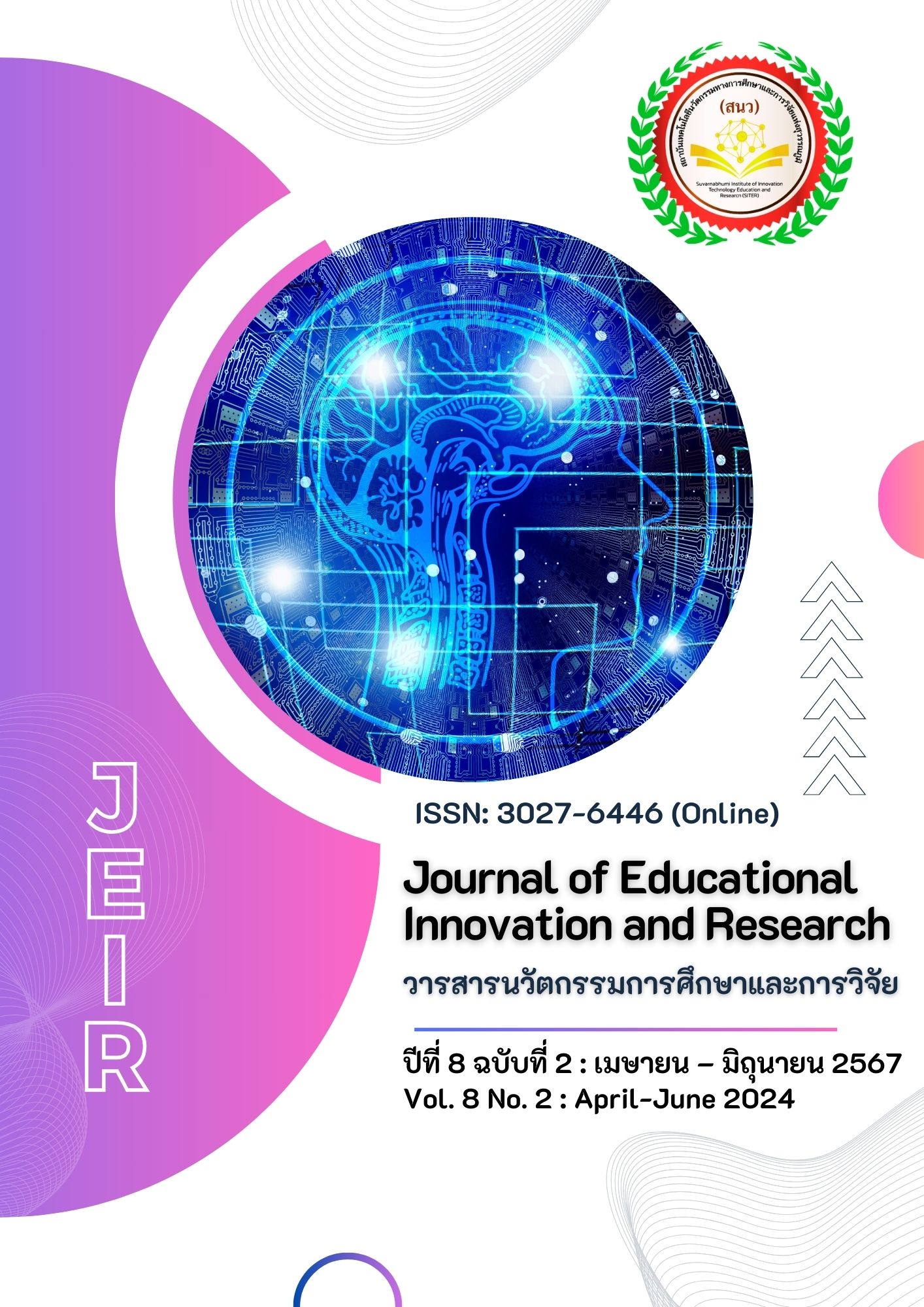รูปแบบการเรียนการสอนเชิงผลิตภาพเพื่อสร้างผลผลิตและนวัตกรรม ในยุคการศึกษา 4.0
Main Article Content
บทคัดย่อ
บทความนี้เป็นการศึกษาเกี่ยวกับรูปแบบการเรียนการสอนเชิงผลิตภาพเพื่อสร้างผลผลิตและนวัตกรรมในยุคการศึกษา 4.0 ด้วยการทบทวนแนวคิดและทฤษฎีจากเอกสารวิชาการและงานวิจัยที่เกี่ยวข้อง โดยมีวัตถุประสงค์เพื่อ 1) ศึกษารูปแบบการเรียนการสอนที่สามารถส่งเสริมการคิดเชิงผลิตภาพให้กับผู้เรียนได้ 2) นำหลักการสอนพื้นฐานสู่รูปแบบการเรียนการสอนเชิงผลิตภาพเพื่อให้ผู้เรียนสร้างผลผลิตและนวัตกรรมได้ เพื่อให้สอดรับกับยุทธศาสตร์ชาติไทยระยะ 20 ปี (พ.ศ. 2561-2580) ที่มุ่งพัฒนาโครงสร้างเศรษฐกิจไปสู่เศรษฐกิจที่ขับเคลื่อนด้วยนวัตกรรม (Value-Based Economy) และเปลี่ยนกระแสการศึกษาให้เป็นไปในทิศทางที่ก่อให้เกิดผลผลิตและนวัตกรรมในทางสร้างสรรค์ ดังนั้นยุคการศึกษา 4.0 จึงเป็นยุคของการศึกษาเชิงผลิตภาพที่ต้องการผลผลิต ซึ่งผลการศึกษาพบว่า
1. รูปแบบการเรียนการสอนเชิงผลิตภาพต้องอาศัยการสอนที่หลากหลายเพื่อให้ได้องค์ความรู้ใหม่และผลิตเป็นผลงานได้ ซึ่งมีการสอน 7 รูปแบบที่สามารถส่งเสริมการคิดเชิงผลิตภาพให้เกิดกับผู้เรียนได้ คือ 1) การสอนแบบใช้ปัญหาเป็นฐาน 2) การสอนแบบเน้นกรณีศึกษา 3) การสอนแบบวิจัยเป็นฐาน 4) การสอนแบบโครงงานเป็นฐาน 5) การสอนแบบเน้นผลงาน 6) การสอนแบบเน้นการทำงาน และ 7) การสอนแบบตกผลึก
2. นำหลักการสอนพื้นฐานสู่รูปแบบการเรียนการสอนเชิงผลิตภาพเพื่อให้ผู้เรียนสร้างผลผลิตและนวัตกรรมได้ทั้งหมด 5 ขั้นตอน คือ 1) Situated learning คือ การกระตุ้นคิดผ่านสถานการณ์จริง 2) Creative-based learning คือ สรรหาแรงบันดาลใจจากงานสร้างสรรค์ 3) Self-directed learning and collaborative learning คือ สานฝันตนเองร่วมกันเป็นกลุ่ม 4) Project-based learning คือ การพัฒนาโครงการ และ 5) Mini company project คือ ผ่านบริษัทจำลอง โดยผู้สอนจะได้ทบทวนความรู้และได้องค์ความรู้ใหม่ ๆ ด้านวิชาชีพเพื่อมาถ่ายทอดให้ผู้เรียนเปลี่ยนแปลงพฤติกรรมและพัฒนากระบวนการคิด ทำให้เป้าหมายการเรียนมีประสิทธิผลจนเกิดการสร้างสรรค์ผลงานและนวัตกรรม ดังนั้นรูปแบบการเรียนการสอนเชิงผลิตภาพนี้นอกจากจะมีคุณค่าและประโยชน์แก่ผู้เรียนและผู้สอนทางการศึกษาแล้ว ยังเป็นพลังสำคัญในการขับเคลื่อนให้เกิดการเปลี่ยนแปลงทางเศรษฐกิจและสังคมไทยได้ในอนาคต
Article Details

อนุญาตภายใต้เงื่อนไข Creative Commons Attribution-NonCommercial-NoDerivatives 4.0 International License.
เอกสารอ้างอิง
Adams, K. (2006). The Sources of Innovation and Creativity. National Center on Education and Economy.
Areesophonpichet, S. (2017). Productivity-based School. In P. Sinlarat (Ed.), Kid Phalitaphaab: Sorn Lae Saang Yang Rai [Productivity Thinking: How to teach and create] (2nd ed.). Chulalongkorn University Press.
Bloom, B.S. (1972). Taxonomy of Educational Objectives. David Mckay Company.
Chareonwongsak, K. (2016). The New Future of Thai Education in Thailand 4.0 Era. Mahidol University Library and Knowledge Center. http://www.li.mahidol.ac.th/conference2016/thailand4.pdf
Cranton, P. (2016). Understanding & Promoting Transformative Learning: A Guide to Theory and Practice. (3rd ed.). Stylus Publishing.
Daud, & Salina. (2008). Knowledge Creation and Innovation in Classroom. World Academy of Science, Engineering and Technology International Journal of Educational and Pedagogical Sciences., 4(2), 440-442.
Delahaye, B. L. (2005). Human resource development: Adult learning and knowledge management. John Wiley & Sons.
Gomaratut, S. (2014). Productivity-based Learning. Journal of Education Prince of Songkla University, 25(3), 1-11.
Harel, I and Papert, S. (1991). Constructionism. Ablex Publishing.
Holgado, A., & Penalvo, F.J. (2017).A metamodel proposal for developing learning ecosystems. Learning and collaboration technologies: Novel learning ecosystems. Springer International Publishing.
Jenson, M.C., & Meckling, W. (2001). Specific and General Knowledge and Organizational Structure. Replika Press.
Kondratova, l., Molyneaux, H., & Fournier, H. (2017). Design considerations for competency functionality within a learning ecosystem.Learning and collaboration technologies: Novel learning ecosystems. Springer International Publishing.
Kouzes, J. M. & Posner, B. (2002). The leadership challenge. (3rd ed). Jossey-Bass.
Lekhakula, A. (2011). Problem-based Learning. Huachiew Chalermprakiet University.
McClelland, D. C. (1961). The Achieving Society. D. Van Nostrand Company Ine.
McKinney, S. E. (2008.Developing teachers for high-poverty school: The role of the internship experience. Urban Education, 43(1), 68-82.
Na Ayudhya, J. (2010). Khunnatham Nam Kwamroo [Virtues Leading Knowledge]. Free Mind Publishing.
Nuangchalerm, P. (2017). Wijai Kaanriankaansorn [Instructional Research] (3rd ed.). Chulalongkorn University Press.
Patton, A. and Robin, J. (2012.Work that matters: The teachers’ guide to project based Learning. Pual Hamlyn Foundation, Learning Futures.
Sinlarat, P. (2008). Ajaan Mue Aacheep Naewkid Krueangmue Lae Kaanpattana [Professional teachers, Concepts, Instruments, and Development]. Office of the Higher Education Commission, Ministry of Education.
Sinlarat, P. (2015). Rongrian Phalitaphaab: Sattathat phuea kaanjudkaan [Productivity-based School: media for learning management]. College of Education Sciences, Dhurakij Pundit University.
Sinlarat, P. (2016). Kid Phalitaphaab: Sorn Lae Saang Yang Rai [Productivity Thinking: How to teach and create]. Chulalongkorn University Press.
Sinlarat, P. (2017). Rongrian 4.0: Rongrian Phalitaphaab [School 4.0: Productive School] (2nd ed.). College of Education Sciences, Dhurakij Pundit University.
Sinlarat, P., & Juithong, S. (2021). Productive Learning in Higher Education]. In P. Sinlarat (Ed.), Kaansuksa Choeng Phalitaphaab: Kaanrian kaansorn Phuea Saang Pholphalit Lae Nawattakam [Productive Education: Education for productivity and innovation]. Chulalongkorn University Press.
Songkram, N. (2019). Kaansaang Nawattakam: Plean Phoorian Haipen Phoo Saang Nawattakam [Inventing Innovation: Turn Learners into Innovators] (3rd ed.). Chulalongkorn University Press.
Strobel, J., van Barneveld, A. (2009). When is PBL More Effective? A Meta-synthesis of Meta- analyses Comparing PBL to Conventional Classrooms. Interdisciplinary Journal of Problem-Based Learning, 3(1). https://doi.org/10.7771/1541-5015.1046
Sutthirat, C. (2018). Nawattakam Kaanjudkaanrianroo Tee Nenphoorian Pensamkan [Innovative learning-oriented Learning Management]. P Balance Design & Printing.
Udom, P. (2011). Active teaching and learning approaches in science (ATLAS). Journal of Education Faculty of Education, Prince of Songkla University, Pattani campus, 22(3), 320-321.
United States department of Agriculture. (2015). Head, Heart, Hands and Health: 4-H Engages America’s Youth. https://nifa.usda.gov
Wallace, V., & Husid, W. (2012). Learning to the second power: Inquiry-based collaboration and learning commons. Teacher Librarian, 39(3), 25-29.
Wongpibool, P. (2017). Active Learning. Journal of Yanasangvorn Research Institute Mahamakut Buddhist University, 8(2), 327–336.
Youngsuksathaporn, P. (2018). Nawattakorn See Baeb [4 Types of Innovators]. National Innovation Agency.
Zhao, Y. (2012).World Class Learners: Educating Creative and Entrepreneurial Students. A sage Company.


